Burt A. The Evolution of the British Empire and Commonwealth From the American Revolution
Подождите немного. Документ загружается.

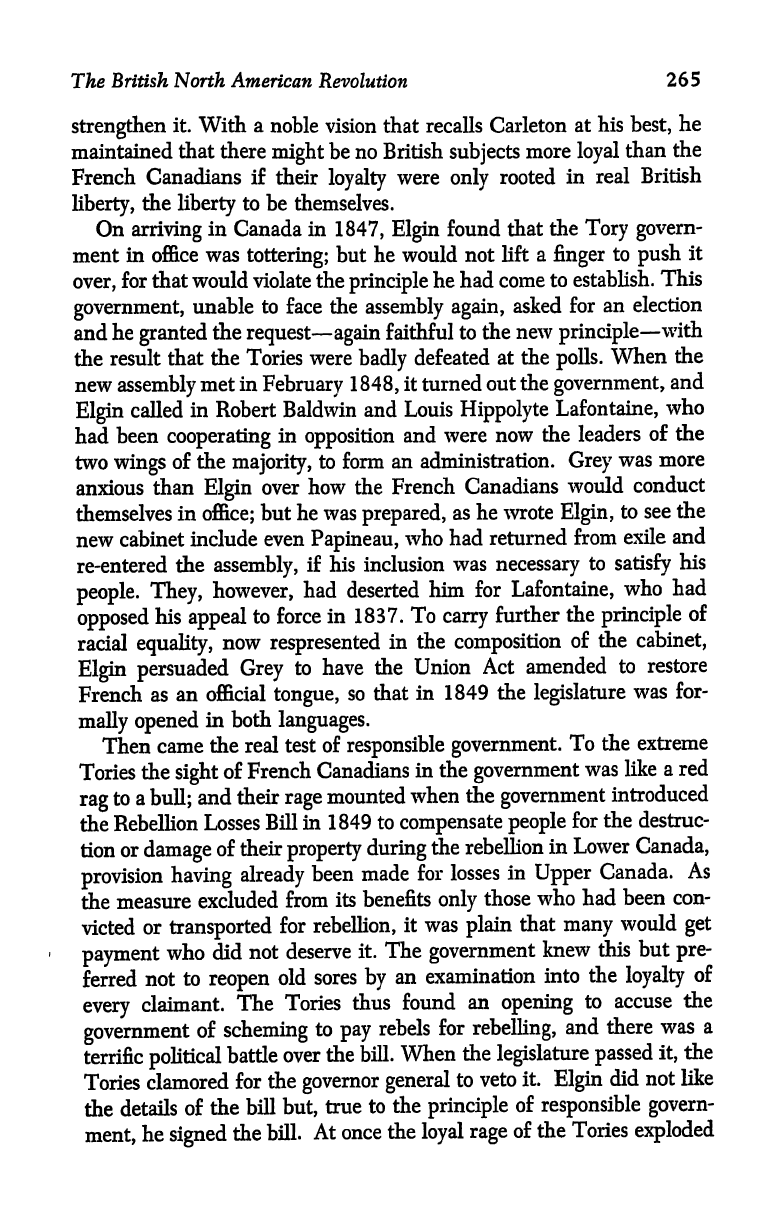
The
British North
American
Revolution
265
strengthen
it. With
a
noble vision that recalls Carleton
at
his
best,
he
maintained
that
there
might
be no
British
subjects
more
loyal
than
the
French
Canadians
if
their
loyalty
were
only
rooted
in
real
British
liberty,
the
liberty
to be themselves.
On
arriving
in
Canada
in
1847,
Elgin
found that
the
Tory govern-
ment
in
office
was
tottering;
but
he would not
lift
a
finger
to
push
it
over,
for that would violate the
principle
he
had come
to
establish.
This
government,
unable to face the
assembly again,
asked
for
an election
and
he
granted
the
request again
faithful to
the
new
principle
with
the
result
that the
Tories were
badly
defeated
at
the
polls.
When
the
new
assembly
met
in
February
1848,
it
turned
out
the
government,
and
Elgin
called
in
Robert Baldwin
and
Louis
Hippolyte
Lafontaine,
who
had
been
cooperating
in
opposition
and
were
now
the
leaders
of the
two
wings
of
the
majority,
to
form
an administration.
Grey
was more
anxious
than
Elgin
over
how the French
Canadians
would
conduct
themselves
in
office;
but he
was
prepared,
as
he
wrote
Elgin,
to
see
the
new
cabinet
include
even
Papineau,
who
had
returned
from
exile
and
re-entered
the
assembly,
if his
inclusion
was
necessary
to
satisfy
his
people.
They,
however,
had deserted
him for
Lafontaine,
who
had
opposed
his
appeal
to force
in 1837. To
carry
further
the
principle
of
racial
equality,
now
respresented
in
the
composition
of
die
cabinet,
Elgin
persuaded
Grey
to
have the Union
Act
amended
to
restore
French
as
an
official
tongue,
so
that
in 1849
the
legislature
was for-
mally opened
in both
languages.
Then
came
the real
test
of
responsible
government.
To
the
extreme
Tories
the
sight
of
French
Canadians
in the
government
was like
a red
rag
to
a
bull;
and their
rage
mounted
when
the
government
introduced
the
Rebellion
Losses
Bill
in 1849
to
compensate
people
for
the destruc-
tion
or
damage
of their
property
during
the
rebellion
in Lower
Canada,
provision
having
already
been
made
for losses
in
Upper
Canada.
As
the
measure
excluded
from
its benefits
only
those
who had
been
con-
victed
or
transported
for
rebellion,
it was
plain
that
many
would
get
payment
who
did
not
deserve
it.
The
government
knew
this but
pre-
ferred
not
to
reopen
old
sores
by
an
examination
into
the
loyalty
of
every
claimant.
The
Tories
thus
found
an
opening
to
accuse
the
government
of
scheming
to
pay
rebels for
rebelling,
and
there
was
a
terrific
political
battle
over
the bill.
When
the
legislature
passed
it,
the
Tories
clamored
for
the
governor
general
to
veto
it.
Elgin
did not
like
the
details
of
the bill
but,
true
to
the
principle
of
responsible
govern-
ment,
he
signed
the
bill.
At once
the
loyal
rage
of
the
Tories
exploded
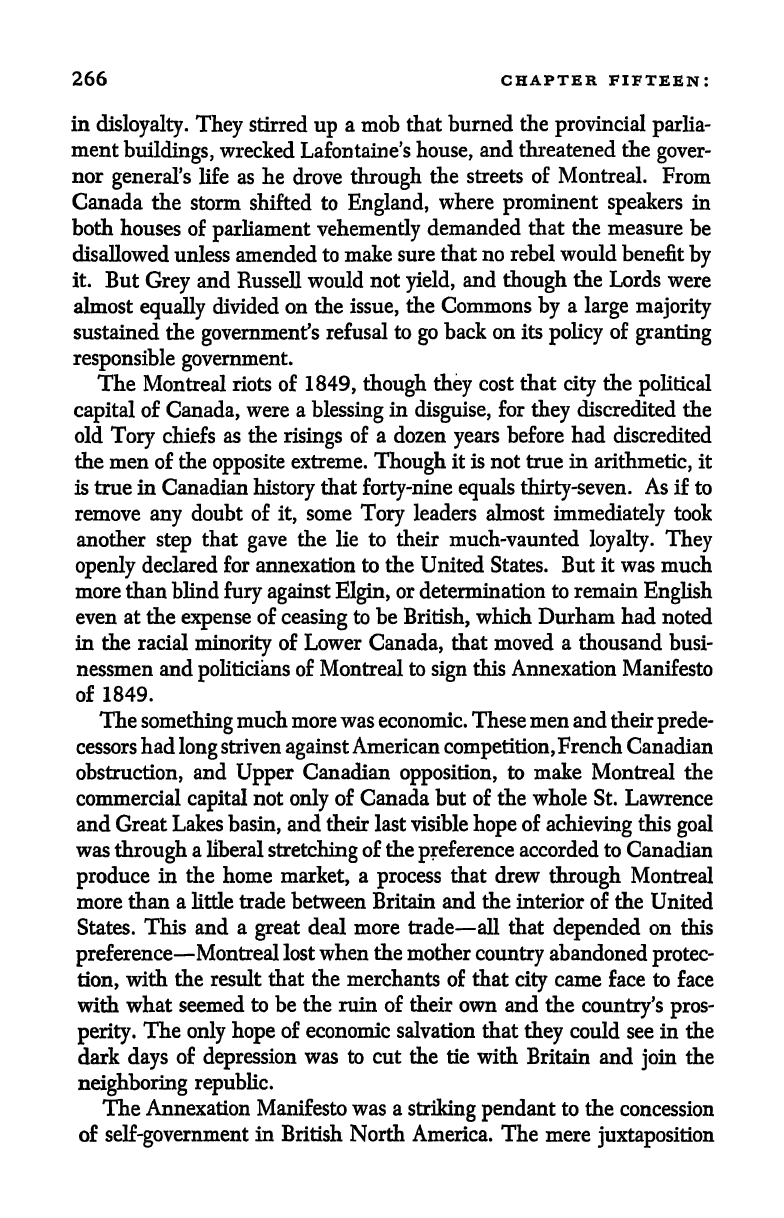
266 CHAPTER
FIFTEEN:
in
disloyalty.
They
stirred
up
a
mob
that burned
the
provincial
parlia-
ment
buildings,
wrecked Lafontaine's
house,
and threatened the
gover-
nor
general's
life
as
he
drove
through
the
streets
of
Montreal.
From
Canada
the
storm shifted
to
England,
where
prominent speakers
in
both
houses
of
parliament
vehemently
demanded
that
the
measure
be
disallowed
unless
amended to
make
sure
that no rebel
would
benefit
by
it.
But
Grey
and
Russell
would
not
yield,
and
though
the
Lords
were
almost
equally
divided
on the
issue,
the
Commons
by
a
large
majority
sustained
the
government's
refusal
to
go
back on its
policy
of
granting
responsible
government.
The
Montreal
riots
of
1849,
though
they
cost
that
city
the
political
capital
of
Canada,
were a
blessing
in
disguise,
for
they
discredited the
old
Tory
chiefs
as the
risings
of a
dozen
years
before had
discredited
the
men
of
the
opposite
extreme.
Though
it
is
not true
in
arithmetic,
it
is true in
Canadian
history
that
forty-nine equals thirty-seven.
As
if to
remove
any
doubt
of
it,
some
Tory
leaders almost
immediately
took
another
step
that
gave
the
lie to
their much-vaunted
loyalty. They
openly
declared
for
annexation to
the United
States.
But
it
was
much
more than blind
fury
against
Elgin,
or
determination
to
remain
English
even at the
expense
of
ceasing
to
be
British,
which Durham had
noted
in the
racial
minority
of
Lower
Canada,
that
moved
a
thousand busi-
nessmen
and
politicians
of
Montreal to
sign
this Annexation
Manifesto
of 1849.
The
something
much
more
was
economic. These
men
and
their
prede-
cessors
had
long
striven
against
American
competition,
French
Canadian
obstruction,
and
Upper
Canadian
opposition,
to
make
Montreal the
commercial
capital
not
only
of Canada but
of
the whole St.
Lawrence
and Great
Lakes
basin,
and
their
last visible
hope
of
achieving
this
goal
was
through
a liberal
stretching
of
the
preference
accorded to
Canadian
produce
in
the
home
market,
a
process
that drew
through
Montreal
more
than
a
little
trade between Britain
and
the
interior of
the
United
States.
This and
a
great
deal more
trade
all that
depended
on
this
preference
Montreal
lost
when
the
mother
country
abandoned
protec-
tion,
with
the result
that the
merchants
of that
city
came face to face
with what
seemed
to be
the
ruin of
their
own
and the
country's
pros-
perity.
The
only
hope
of economic
salvation
that
they
could see in the
dark
days
of
depression
was to cut the tie with
Britain
and
join
the
neighboring
republic.
The
Annexation
Manifesto
was a
striking
pendant
to
the
concession
of
self-government
in British
North America.
The
mere
juxtaposition
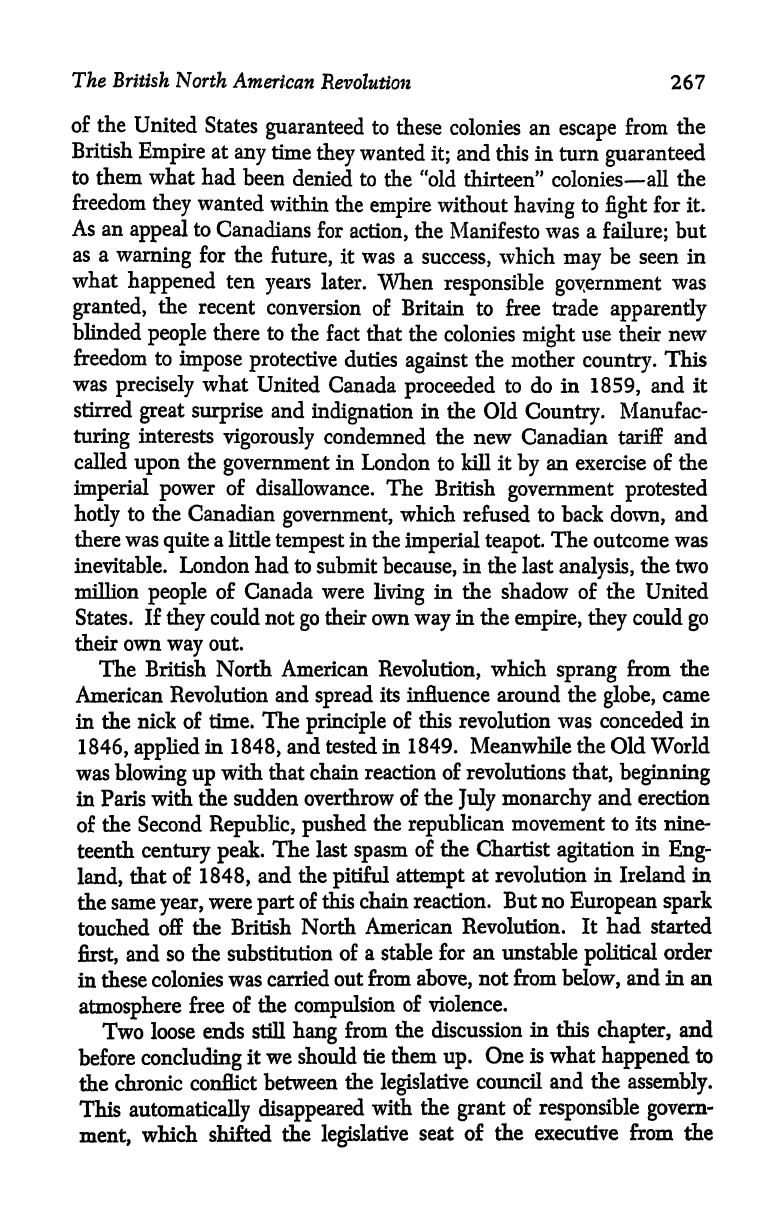
The
British
North
American
Revolution
267
of
the
United
States
guaranteed
to these
colonies an
escape
from
the
British
Empire
at
any
time
they
wanted
it;
and this
in
turn
guaranteed
to
them what
had
been
denied to
the "old thirteen" colonies
all
the
freedom
they
wanted
within
the
empire
without
having
to
fight
for it.
As
an
appeal
to
Canadians
for
action,
the
Manifesto was
a
failure;
but
as a
warning
for
the
future,
it
was
a
success,
which
may
be
seen in
what
happened
ten
years
later.
When
responsible
government
was
granted,
the
recent
conversion
of Britain
to free trade
apparently
blinded
people
there
to
the
fact
that the colonies
might
use their new
freedom to
impose
protective
duties
against
the
mother
country.
This
was
precisely
what
United
Canada
proceeded
to
do in
1859,
and
it
stirred
great surprise
and
indignation
in the
Old
Country.
Manufac-
turing
interests
vigorously
condemned
the
new
Canadian
tariff
and
called
upon
the
government
in
London
to
kill
it
by
an
exercise
of
the
imperial power
of
disallowance. The British
government
protested
hotly
to the
Canadian
government,
which refused
to back
down,
and
there
was
quite
a
little
tempest
in
the
imperial teapot.
The outcome
was
inevitable. London
had to
submit
because,
in
the last
analysis,
the two
million
people
of
Canada
were
living
in the
shadow of
the United
States. If
they
could
not
go
their own
way
in
the
empire, they
could
go
their
own
way
out.
The
British North
American
Revolution,
which
sprang
from the
American Revolution
and
spread
its
influence around the
globe,
came
in the
nick
of
time. The
principle
of
this
revolution was conceded
in
1846,
applied
in
1848,
and
tested
in 1849. Meanwhile
the
Old World
was
blowing up
with
that
chain
reaction of revolutions
that,
beginning
in
Paris
with die sudden overthrow
of
the
July
monarchy
and
erection
of
the Second
Republic, pushed
the
republican
movement
to
its nine-
teenth
century peak.
The last
spasm
of
the
Chartist
agitation
in
Eng-
land,
that
of
1848,
and
the
pitiful
attempt
at
revolution
in
Ireland in
the
same
year,
were
part
of
this
chain reaction.
But no
European
spark
touched
off
the
British
North
American
Revolution. It had started
first,
and
so the
substitution
of
a
stable
for
an
unstable
political
order
in these
colonies
was carried
out
from
above,
not
from
below,
and
in an
atmosphere
free
of
the
compulsion
of
violence.
Two loose
ends
still
hang
from
the discussion
in
this
chapter,
and
before
concluding
it
we should
tie
them
up.
One
is what
happened
to
the
chronic
conflict
between
the
legislative
council
and the
assembly.
This
automatically
disappeared
with the
grant
of
responsible
govern-
ment,
which
shifted
the
legislative
seat of the
executive from
the
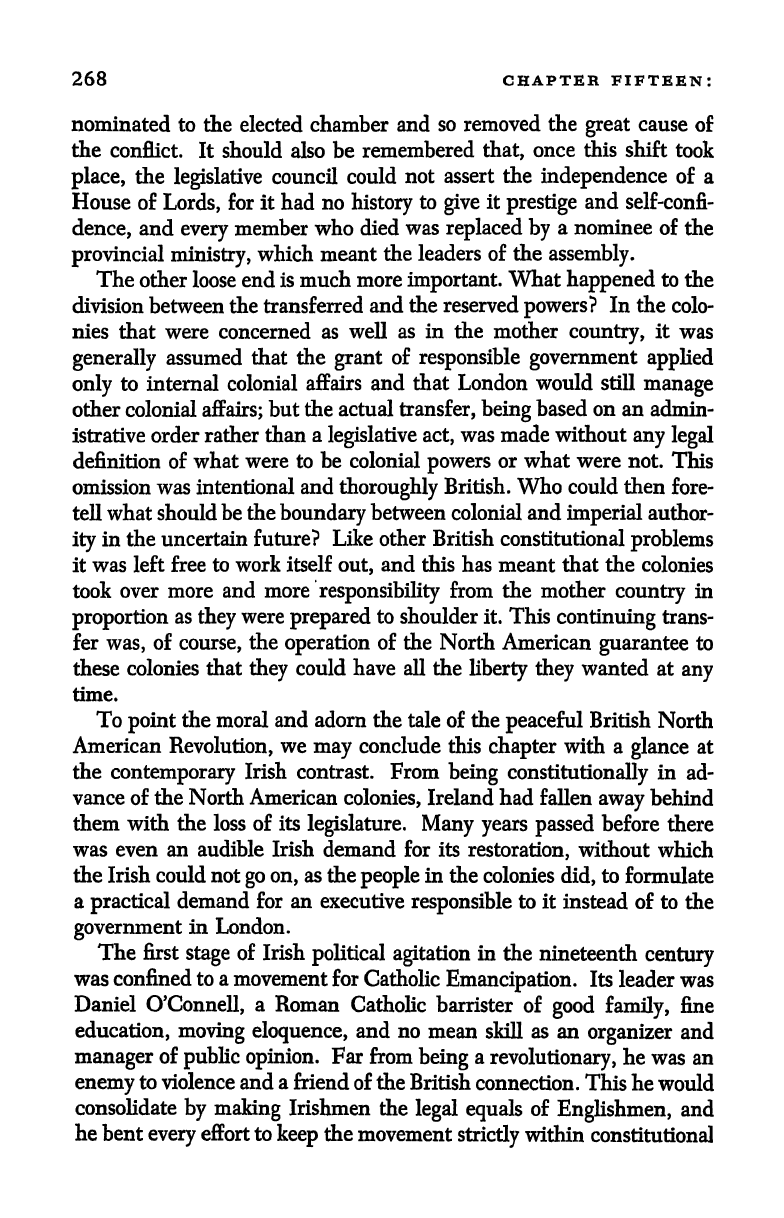
268
CHAPTER
FIFTEEN:
nominated
to
the
elected
chamber
and
so removed
the
great
cause
of
the
conflict.
It should also be
remembered
that,
once this shift
took
place,
the
legislative
council could
not assert
the
independence
of a
House of
Lords,
for
it
had
no
history
to
give
it
prestige
and
self-confi-
dence,
and
every
member
who died
was
replaced
by
a nominee
of
the
provincial
ministry,
which
meant
the leaders
of
the
assembly.
The
other
loose end
is much more
important.
What
happened
to
the
division
between the
transferred
and the reserved
powers?
In the
colo-
nies that
were concerned
as
well
as in the mother
country,
it
was
generally
assumed
that the
grant
of
responsible government
applied
only
to internal
colonial
affairs and
that London
would
still
manage
other
colonial
affairs;
but
the
actual
transfer,
being
based on an
admin-
istrative
order
rather
than
a
legislative
act,
was made
without
any
legal
definition of
what
were
to
be
colonial
powers
or
what were
not.
This
omission
was intentional
and
thoroughly
British. Who
could
then
fore-
tell
what should
be
the
boundary
between colonial and
imperial
author-
ity
in the uncertain
future?
Like
other
British
constitutional
problems
it
was
left
free to
work
itself
out,
and this has
meant
that the
colonies
took
over more
and
more
responsibility
from
the mother
country
in
proportion
as
they
were
prepared
to
shoulder it.
This
continuing
trans-
fer
was,
of
course,
the
operation
of the North American
guarantee
to
these
colonies
that
they
could
have
all the
liberty
they
wanted at
any
time.
To
point
the moral and adorn the
tale of
the
peaceful
British
North
American
Revolution,
we
may
conclude this
chapter
with
a
glance
at
the
contemporary
Irish
contrast. From
being constitutionally
in
ad-
vance
of
the North
American
colonies,
Ireland had
fallen
away
behind
them with the loss of
its
legislature. Many
years passed
before
there
was
even
an
audible
Irish
demand
for its
restoration,
without
which
the
Irish
could
not
go
on,
as
the
people
in
the colonies
did,
to
formulate
a
practical
demand for
an
executive
responsible
to it
instead
of to
the
government
in London.
The
first
stage
of Irish
political
agitation
in the
nineteenth
century
was
confined to
a
movement for
Catholic
Emancipation.
Its
leader was
Daniel
O'Connell,
a
Roman
Catholic barrister
of
good
family,
fine
education,
moving
eloquence,
and no
mean
skill
as an
organizer
and
manager
of
public
opinion.
Far
from
being
a
revolutionary,
he
was
an
enemy
to violence
and
a
friend of the
British
connection.
This he
would
consolidate
by
making
Irishmen the
legal equals
of
Englishmen,
and
he bent
every
effort
to
keep
the
movement
strictly
within
constitutional
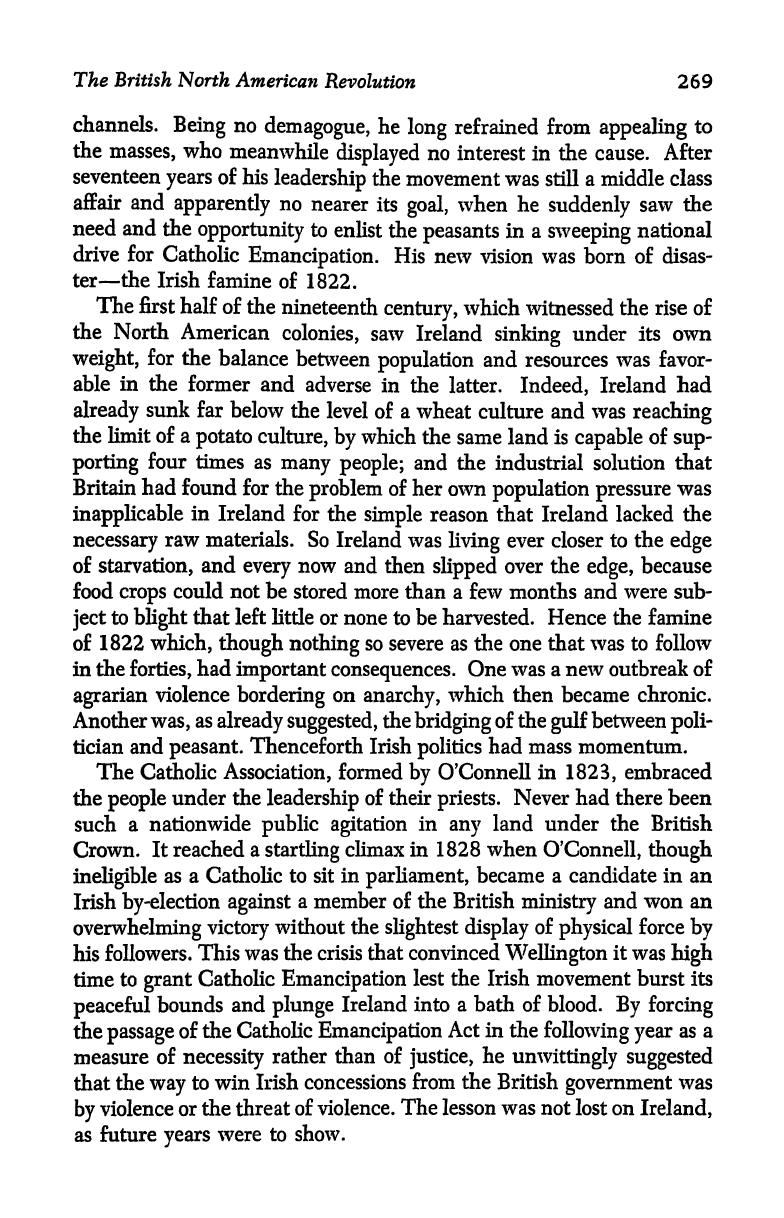
The
British
North
American
Revolution
269
channels.
Being
no
demagogue,
he
long
refrained
from
appealing
to
the
masses,
who
meanwhile
displayed
no interest in the cause.
After
seventeen
years
of
his
leadership
the
movement
was still
a middle class
affair
and
apparently
no
nearer
its
goal,
when he
suddenly
saw
the
need
and
the
opportunity
to
enlist
the
peasants
in
a
sweeping
national
drive for
Catholic
Emancipation.
His new
vision
was
born of disas-
terthe Irish
famine
of
1822.
The
first
half of
the
nineteenth
century,
which
witnessed
the rise
of
the
North
American
colonies,
saw
Ireland
sinking
under its own
weight,
for
the
balance
between
population
and resources
was favor-
able
in
the
former
and
adverse
in the
latter.
Indeed,
Ireland
had
already
sunk
far
below
the
level
of
a
wheat culture
and was
reaching
the
limit of a
potato
culture,
by
which the
same land is
capable
of
sup-
porting
four
times
as
many
people;
and the industrial solution
that
Britain
had
found
for
the
problem
of her
own
population pressure
was
inapplicable
in
Ireland for
the
simple
reason that Ireland lacked
the
necessary
raw
materials.
So
Ireland was
living
ever closer
to the
edge
of
starvation,
and
every
now
and then
slipped
over
the
edge,
because
food
crops
could
not
be
stored
more than a
few months
and
were
sub-
ject
to
blight
that
left little
or none
to be harvested.
Hence the famine
of
1822
which,
though nothing
so severe as the
one
that was to
follow
in the
forties,
had
important
consequences.
One
was a
new
outbreak of
agrarian
violence
bordering
on
anarchy,
which then
became chronic.
Another
was,
as
already
suggested,
the
bridging
of
the
gulf
between
poli-
tician and
peasant.
Thenceforth
Irish
politics
had
mass
momentum.
The Catholic
Association,
formed
by
O'Connell
in
1823,
embraced
the
people
under
the
leadership
of their
priests.
Never had there been
such
a nationwide
public agitation
in
any
land under the
British
Crown.
It
reached
a
startling
climax
in
1828
when
O'Connell,
though
ineligible
as a
Catholic
to sit
in
parliament,
became
a
candidate
in
an
Irish
by-election
against
a
member of the British
ministry
and
won an
overwhelming
victory
without
the
slightest
display
of
physical
force
by
his
followers.
This
was the
crisis that convinced
Wellington
it
was
high
time
to
grant
Catholic
Emancipation
lest the Irish movement burst its
peaceful
bounds
and
plunge
Ireland into
a
bath of
blood.
By
forcing
the
passage
of
the Catholic
Emancipation
Act in the
following
year
as
a
measure
of
necessity
rather than of
justice,
he
unwittingly
suggested
that
the
way
to
win
Irish concessions
from
the
British
government
was
by
violence or
the
threat
of violence.
The
lesson
was
not
lost
on
Ireland,
as future
years
were
to
show.
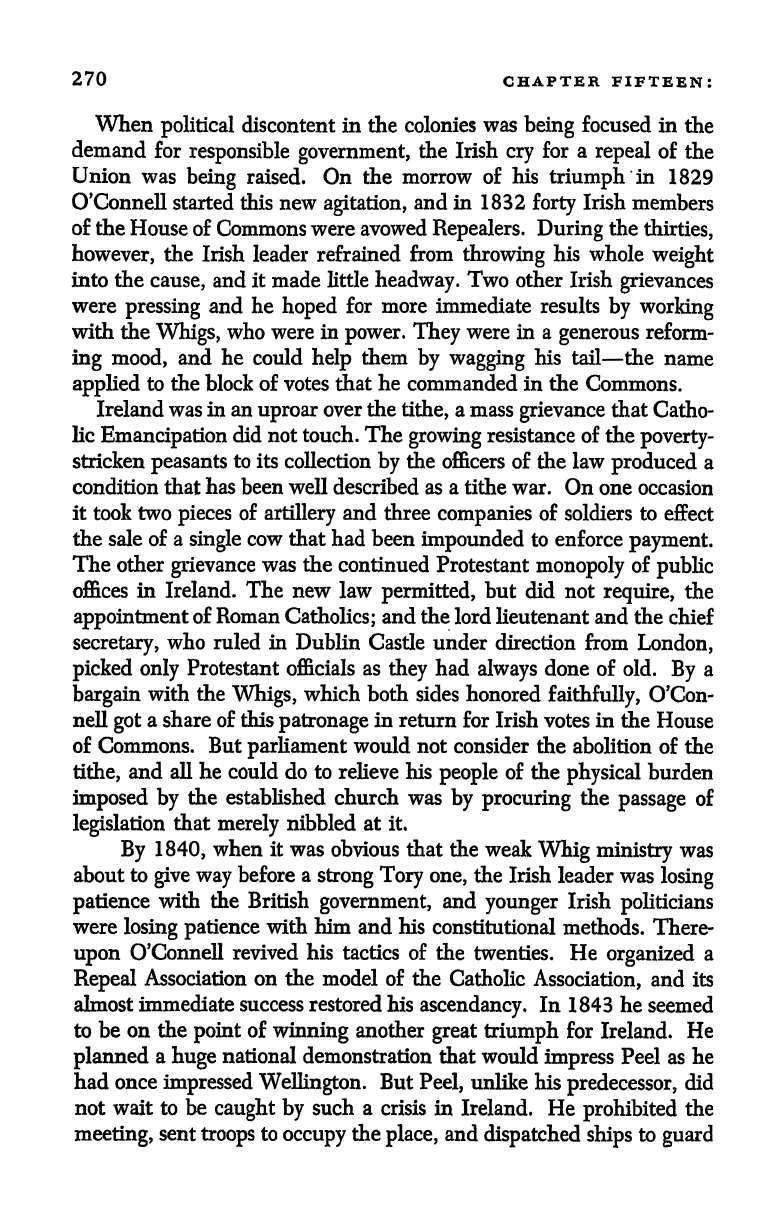
270
CHAPTER
FIFTEEN:
When
political
discontent in the colonies
was
being
focused in
the
demand
for
responsible
government,
the
Irish
cry
for a
repeal
of
the
Union
was
being
raised.
On
the
morrow of his
triumph
in
1829
O'Connell
started this
new
agitation,
and in
1832
forty
Irish
members
of
the
House of
Commons
were avowed
Repealers.
During
the
thirties,
however,
the
Irish leader
refrained
from
throwing
his whole
weight
into the
cause,
and
it made little
headway.
Two
other
Irish
grievances
were
pressing
and
he
hoped
for more immediate
results
by
working
with
the
Whigs,
who
were in
power. They
were in a
generous
reform-
ing
mood,
and
he
could
help
them
by
wagging
his tail
the
name
applied
to
the
block of votes
that
he
commanded
in
the
Commons.
Ireland
was
in an
uproar
over
the
tithe,
a mass
grievance
that
Catho-
lic
Emancipation
did
not
touch.
The
growing
resistance of the
poverty-
stricken
peasants
to its
collection
by
the officers
of
the
law
produced
a
condition
that
has
been well
described as
a
tithe war.
On
one
occasion
it
took two
pieces
of
artillery
and three
companies
of
soldiers
to
effect
the sale of
a
single
cow
that
had been
impounded
to enforce
payment.
The other
grievance
was the
continued
Protestant
monopoly
of
public
offices
in
Ireland.
The new
law
permitted,
but
did not
require,
the
appointment
of
Roman
Catholics;
and the
lord lieutenant
and
the
chief
secretary,
who
ruled in
Dublin
Castle
under
direction
from
London,
picked only
Protestant officials as
they
had
always
done of
old.
By
a
bargain
with
the
Whigs,
which both
sides
honored
faithfully,
O'Con-
nell
got
a
share
of this
patronage
in
return for Irish
votes
in
the
House
of Commons.
But
parliament
would not consider the
abolition
of the
tithe,
and
all
he
could
do
to
relieve his
people
of the
physical
burden
imposed by
the
established church was
by
procuring
the
passage
of
legislation
that
merely
nibbled
at
it.
By
1840,
when it was
obvious
that
the weak
Whig ministry
was
about
to
give way
before a
strong
Tory
one,
the
Irish leader
was
losing
patience
with
the
British
government,
and
younger
Irish
politicians
were
losing
patience
with him
and
his
constitutional methods.
There-
upon
O'Connell
revived his tactics of
the twenties. He
organized
a
Repeal
Association on the
model of the
Catholic
Association,
and
its
almost
immediate success restored
his
ascendancy.
In 1843
he seemed
to
be
on
the
point
of
winning
another
great
triumph
for Ireland.
He
planned
a
huge
national demonstration that
would
impress
Peel as
he
had once
impressed Wellington.
But
Peel,
unlike his
predecessor,
did
not
wait
to be
caught
by
such
a
crisis
in Ireland.
He
prohibited
the
meeting,
sent
troops
to
occupy
the
place,
and
dispatched
ships
to
guard
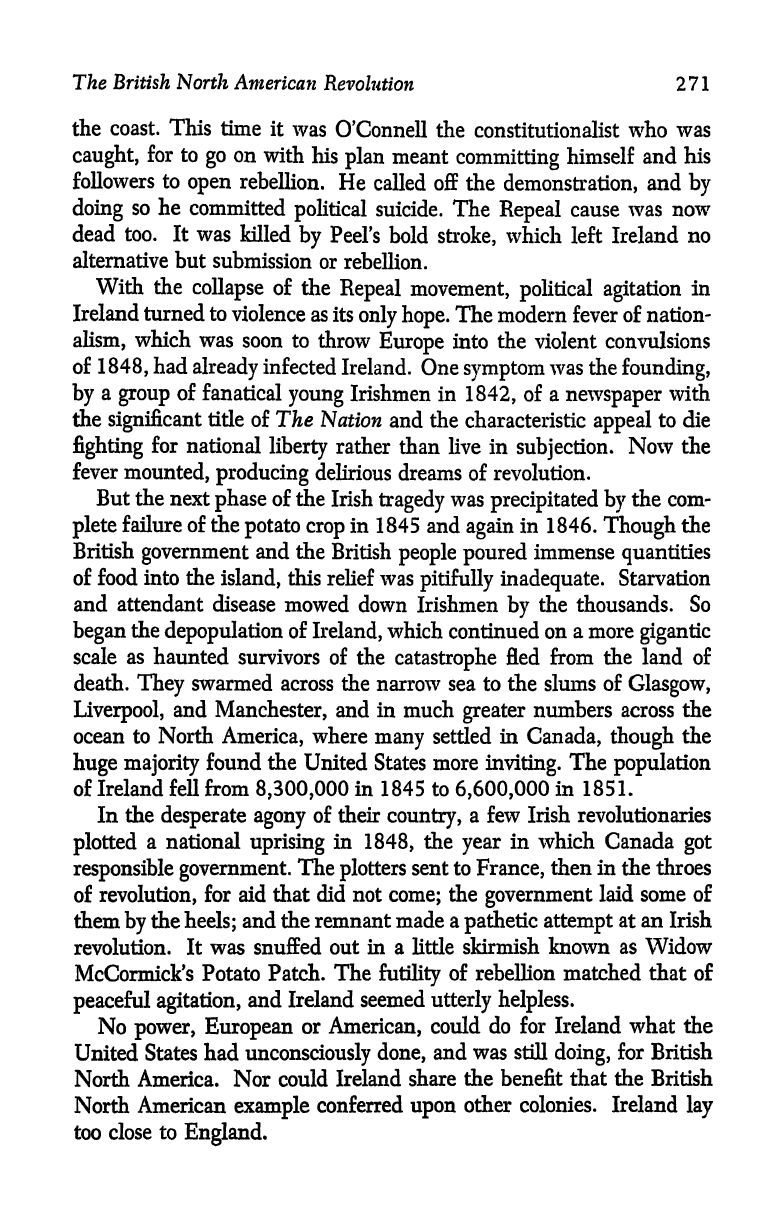
The
British North
American
Revolution
271
the
coast.
This
time
it
was
O'Connell the
constitutionalist
who
was
caught,
for to
go
on
with
his
plan
meant
committing
himself
and his
followers
to
open
rebellion.
He
called
off
the
demonstration,
and
by
doing
so he
committed
political
suicide. The
Repeal
cause
was now
dead
too. It
was
killed
by
Peel's
bold
stroke,
which
left
Ireland
no
alternative but
submission
or
rebellion.
With
the
collapse
of
the
Repeal
movement,
political
agitation
in
Ireland
turned
to
violence as
its
only
hope.
The modern
fever of nation-
alism,
which
was
soon to
throw
Europe
into
the
violent convulsions
of
1848,
had
already
infected
Ireland.
One
symptom
was the
founding,
by
a
group
of
fanatical
young
Irishmen
in
1842,
of a
newspaper
with
the
significant
title
of The
Nation
and
the
characteristic
appeal
to die
fighting
for
national
liberty
rather than live in
subjection.
Now
the
fever
mounted,
producing
delirious dreams
of revolution.
But the
next
phase
of
the
Irish
tragedy
was
precipitated by
the com-
plete
failure of
the
potato
crop
in
1845 and
again
in 1846.
Though
the
British
government
and the
British
people
poured
immense
quantities
of
food
into the
island,
this
relief
was
pitifully inadequate.
Starvation
and attendant
disease
mowed
down Irishmen
by
the thousands.
So
began
the
depopulation
of
Ireland,
which continued on
a
more
gigantic
scale
as
haunted survivors of the
catastrophe
fled
from the land of
death.
They
swarmed across the
narrow sea to the slums
of
Glasgow,
Liverpool,
and
Manchester,
and in much
greater
numbers
across
the
ocean to
North
America,
where
many
settled
in
Canada,
though
the
huge
majority
found
the
United States more
inviting.
The
population
of
Ireland fell from
8,300,000
in 1845
to
6,600,000
in 1851.
In the
desperate
agony
of
their
country,
a few Irish revolutionaries
plotted
a national
uprising
in
1848,
the
year
in
which
Canada
got
responsible government.
The
plotters
sent to
France,
then in
the
throes
of
revolution,
for aid that
did not
come;
the
government
laid some of
them
by
the
heels;
and the
remnant made a
pathetic attempt
at
an
Irish
revolution.
It was snuffed
out in a
little
skirmish
known as
Widow
McCormick's
Potato Patch.
The
futility
of rebellion
matched
that
of
peaceful agitation,
and Ireland
seemed
utterly
helpless.
No
power,
European
or
American,
could
do for Ireland what
the
United
States
had
unconsciously
done,
and was still
doing,
for British
North
America. Nor could
Ireland
share
the
benefit
that
the
British
North
American
example
conferred
upon
other colonies. Ireland
lay
too close to
England.
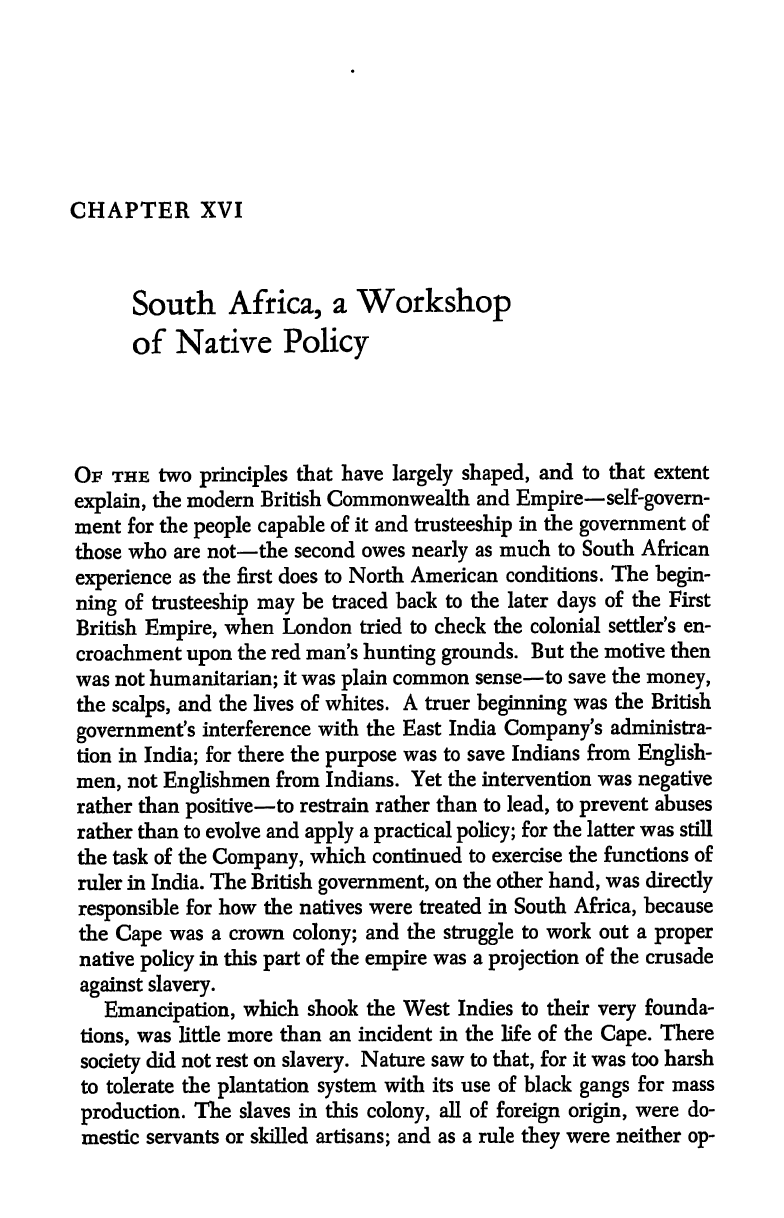
CHAPTER
XVI
South
Africa,
a
Workshop
of Native
Policy
OF
THE
two
principles
that
have
largely
shaped,
and
to
that
extent
explain,
the modern
British
Commonwealth
and
Empire self-govern-
ment
for
the
people
capable
of
it and
trusteeship
in
the
government
of
those
who are
not
the
second
owes
nearly
as
much
to South
African
experience
as the
first does
to
North
American
conditions.
The
begin-
ning
of
trusteeship
may
be traced
back
to
the later
days
of
the First
British
Empire,
when
London
tried to check
the
colonial
settler's
en-
croachment
upon
the
red man's
hunting grounds.
But the motive
then
was
not
humanitarian;
it was
plain
common
sense
to
save
the
money,
the
scalps,
and
the lives
of
whites.
A truer
beginning
was
the British
government's
interference
with
the
East
India
Company's
administra-
tion
in
India;
for there the
purpose
was to save
Indians
from
English-
men,
not
Englishmen
from
Indians.
Yet the
intervention
was
negative
rather
than
positive
to
restrain
rather than
to
lead,
to
prevent
abuses
rather
than
to evolve
and
apply
a
practical
policy;
for
the latter
was still
the task
of
the
Company,
which
continued
to
exercise the
functions
of
ruler
in India.
The
British
government,
on the other
hand,
was
directly
responsible
for
how
the natives were
treated
in
South
Africa,
because
the
Cape
was
a
crown
colony;
and
the
struggle
to work
out a
proper
native
policy
in
this
part
of
the
empire
was a
projection
of
the
crusade
against
slavery.
Emancipation,
which
shook the West
Indies
to their
very
founda-
tions,
was
little
more
than
an incident
in the life of
the
Cape.
There
society
did not
rest on
slavery.
Nature saw to
that,
for
it
was too
harsh
to
tolerate
the
plantation
system
with its use
of
black
gangs
for mass
production.
The slaves
in
this
colony,
all
of
foreign origin,
were do-
mestic
servants
or
skilled
artisans;
and as a rule
they
were
neither
op-
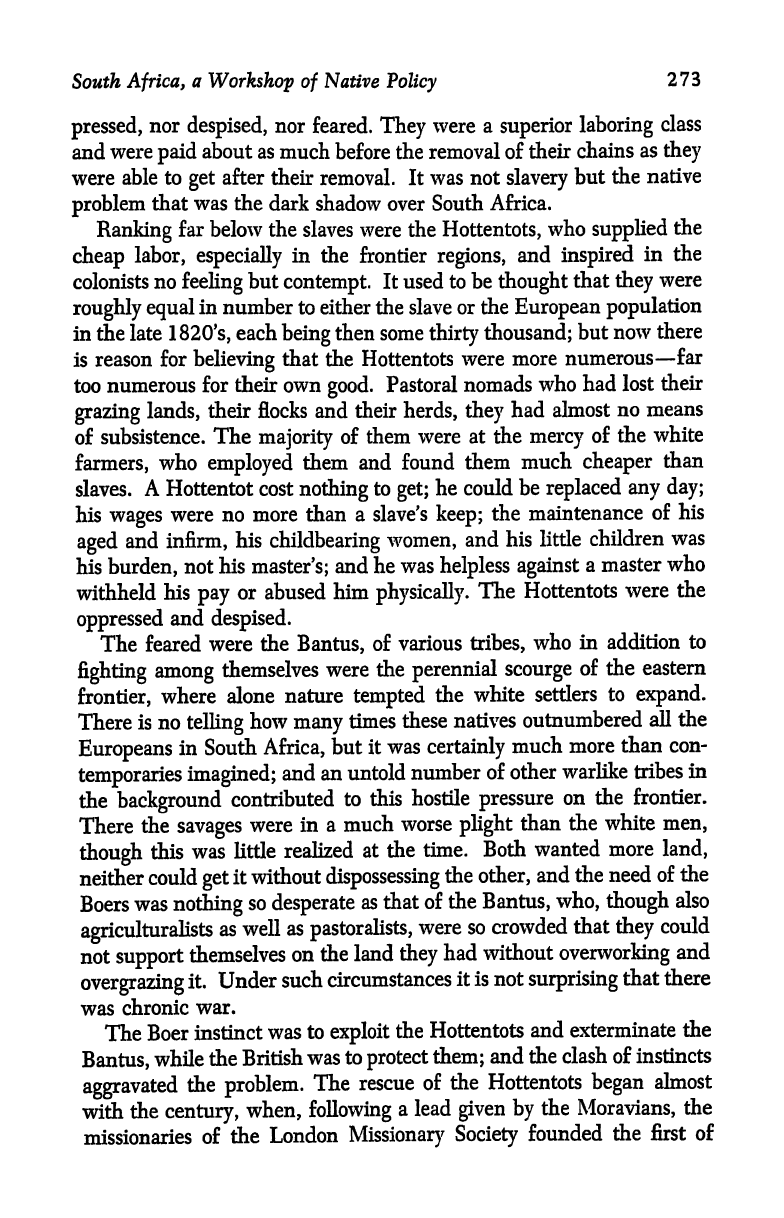
South
Africa,
a
Workshop
of
Native
Policy
273
pressed,
nor
despised,
nor
feared.
They
were
a
superior
laboring
class
and
were
paid
about as
much
before
the removal of
their
chains
as
they
were
able
to
get
after
their
removal.
It
was not
slavery
but
the
native
problem
that
was the
dark
shadow over
South
Africa.
Ranking
far
below
the
slaves
were
the
Hottentots,
who
supplied
the
cheap
labor,
especially
in the
frontier
regions,
and
inspired
in the
colonists
no
feeling
but
contempt.
It
used to be
thought
that
they
were
roughly
equal
in
number
to
either
the
slave or the
European
population
in
the late
1820's,
each
being
then some
thirty
thousand;
but
now
there
is
reason for
believing
that
the Hottentots
were more
numerous
far
too
numerous
for
their
own
good.
Pastoral nomads
who
had lost
their
grazing
lands,
their
flocks
and
their
herds,
they
had
almost
no means
of
subsistence.
The
majority
of
them were
at
the
mercy
of
the
white
farmers,
who
employed
them
and
found
them
much
cheaper
than
slaves.
A Hottentot cost
nothing
to
get;
he
could
be
replaced
any
day;
his
wages
were no
more than a slave's
keep;
the maintenance
of
his
aged
and
infirm,
his
childbearing
women,
and
his
little
children
was
his
burden,
not
his
master's;
and he
was
helpless
against
a master
who
withheld
his
pay
or
abused
him
physically.
The Hottentots
were
the
oppressed
and
despised.
The
feared
were
the
Bantus,
of
various
tribes,
who
in addition
to
fighting
among
themselves
were the
perennial
scourge
of
the
eastern
frontier,
where alone
nature
tempted
the
white settlers
to
expand.
There
is
no
telling
how
many
times
these
natives outnumbered
all
the
Europeans
in South
Africa,
but
it
was
certainly
much
more
than con-
temporaries
imagined;
and an
untold
number
of other
warlike tribes
in
the
background
contributed
to this
hostile
pressure
on
the frontier.
There
the
savages
were
in
a much
worse
plight
than
the white
men,
though
this
was little
realized
at the
time.
Both
wanted
more
land,
neither
could
get
it without
dispossessing
the
other,
and
the need
of
the
Boers
was
nothing
so
desperate
as
that
of
the
Bantus, who,
though
also
agriculturalists
as
well
as
pastoralists,
were so
crowded
that
they
could
not
support
themselves
on
the
land
they
had
without
overworking
and
overgrazing
it.
Under
such
circumstances
it is not
surprising
that
there
was
chronic
war.
The
Boer
instinct
was to
exploit
the
Hottentots
and exterminate
the
Bantus,
while
the
British
was
to
protect
them;
and
the clash of
instincts
aggravated
the
problem.
The
rescue
of
the Hottentots
began
almost
with
the
century,
when,
following
a lead
given
by
the
Moravians,
the
missionaries
of
die
London
Missionary
Society
founded
the first
of
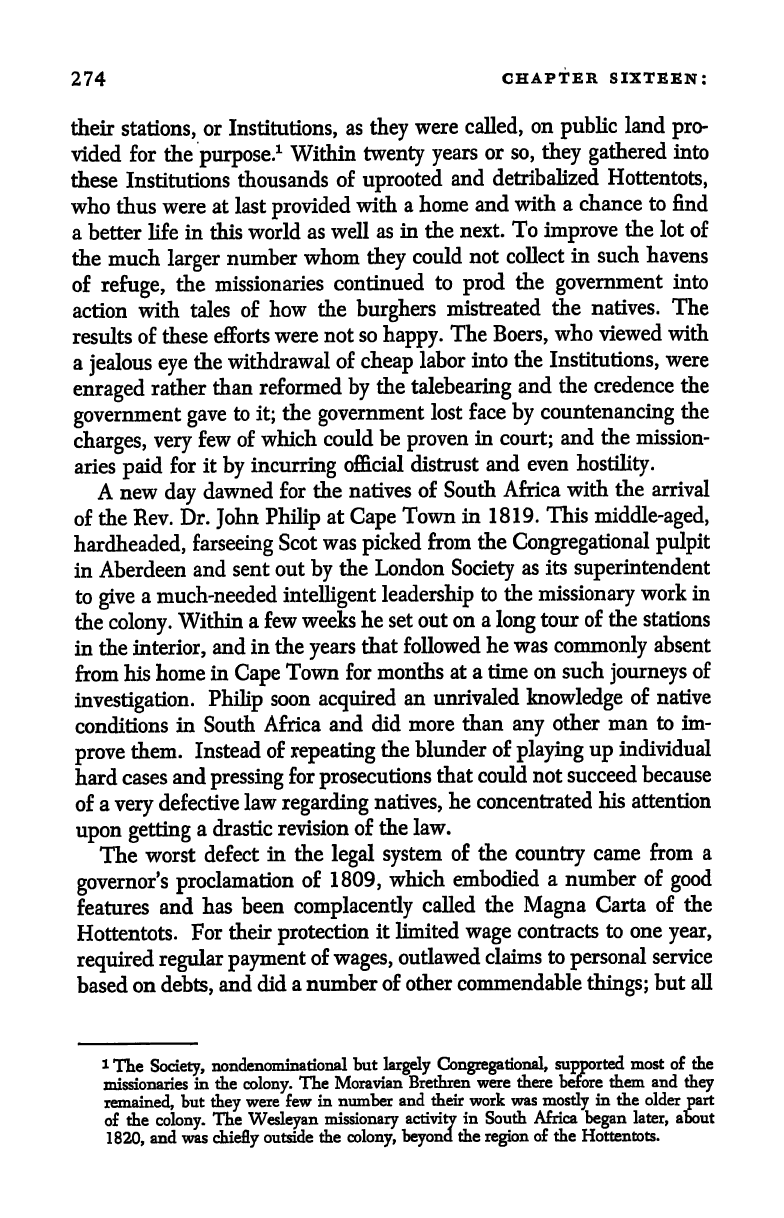
274
CHAPTER
SIXTEEN:
their
stations,
or
Institutions,
as
they
were
called,
on
public
land
pro-
vided for the
purpose.
1
Within
twenty
years
or
so,
they
gathered
into
these Institutions
thousands
of
uprooted
and detribalized
Hottentots,
who
thus
were at last
provided
with
a home
and
with
a chance
to
find
a
better life
in
this
world
as
well
as
in
the
next.
To
improve
the
lot
of
the
much
larger
number
whom
they
could
not
collect
in such
havens
of
refuge,
the
missionaries
continued
to
prod
the
government
into
action
with tales
of how
the
burghers
mistreated
the
natives.
The
results
of
these
efforts
were
not
so
happy.
The
Boers,
who viewed with
a
jealous
eye
the
withdrawal
of
cheap
labor
into
the
Institutions,
were
enraged
rather
than reformed
by
the
talebearing
and the
credence
the
government
gave
to
it;
the
government
lost
face
by
countenancing
the
charges,
very
few
of
which could
be
proven
in
court;
and
the
mission-
aries
paid
for
it
by
incurring
official
distrust
and
even
hostility.
A new
day
dawned
for
the
natives of
South
Africa
with
the
arrival
of
the
Rev.
Dr.
John
Philip
at
Cape
Town in
1819.
This
middle-aged,
hardheaded,
farseeing
Scot
was
picked
from
the
Congregational
pulpit
in
Aberdeen
and
sent out
by
the
London
Society
as its
superintendent
to
give
a
much-needed
intelligent
leadership
to
the
missionary
work
in
the
colony.
Within
a few
weeks
he set out on
a
long
tour
of
the
stations
in
the
interior,
and
in
the
years
that
followed
he
was
commonly
absent
from
his
home
in
Cape
Town for
months
at a time on
such
journeys
of
investigation.
Philip
soon
acquired
an
unrivaled
knowledge
of native
conditions
in South
Africa
and
did
more
than
any
other
man to im-
prove
them.
Instead
of
repeating
the
blunder
of
playing
up
individual
hard
cases
and
pressing
for
prosecutions
that
could not
succeed
because
of
a
very
defective
law
regarding
natives,
he concentrated
his
attention
upon getting
a
drastic
revision
of
the law.
The
worst
defect
in the
legal
system
of
the
country
came from
a
governor's
proclamation
of
1809,
which
embodied
a
number
of
good
features
and
has been
complacently
called
the
Magna
Carta
of the
Hottentots.
For
their
protection
it limited
wage
contracts
to
one
year,
required
regular
payment
of
wages,
outlawed
claims
to
personal
service
based
on
debts,
and did
a
number
of
other
commendable
things;
but all
1
The
Society,
nondenominational
but
largely
Congregational,
supported
most of the
missionaries
in
the
colony.
The
Moravian
Brethren
were
there before them and
they
remained,
but
they
were
few in
number
and their work
was
mostly
in the older
part
of
the
colony.
The
Wesleyan
missionary
activity
in
South
Africa
began
later,
about
1820,
and was
chiefly
outside
the
colony,
beyond
the
region
of the Hottentots.
